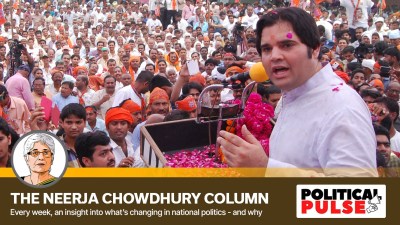- India
- International
The greatest threat to Pakistan comes from Afghanistan rather than Kashmir
The Kashmir issue may not vanish from the regional and global agenda, but it is the Pashtun question which will continue to haunt the future of Pakistan and the Subcontinent.
 It is a myth that Kashmir is the sole source of the conflict between India and Pakistan. (File Photo)
It is a myth that Kashmir is the sole source of the conflict between India and Pakistan. (File Photo)
As he threatens to lock down Islamabad if Imran Khan does not resign, the leader of the Jamiat-ulema-e-Islam, Maulana Fazlur Rehman responded to two major charges from the Pakistani establishment. One was the accusation that he was promoting an Indian agenda. The Maulana responded by reminding his audience that it was Imran Khan who said that the re-election of Narendra Modi will help resolve the Kashmir dispute. Imran Khan’s incompetence, Rehman said, led to Modi’s “annexation” of Kashmir. In Islamabad, India is a whipping boy for all sides.
The establishment also pointed to the flags of Afghanistan and the Taliban being waved by many of the protestors. The Maulana dismissed these concerns as frivolous. While appealing to his followers not to wave the Taliban flags, he reminded the public that the governments of Pakistan and many others were embracing the Taliban. In any case, both the Maulana and Imran have long been supporters of the Taliban.
The broad agreement in Islamabad that India is the threat and the Taliban is an ally, hides an important a reality — the greatest threat to Pakistan comes from Afghanistan rather than the unfinished agenda of Kashmir. Amidst the super-charged rhetoric in Pakistan about Kashmir, after the Indian decision to change the state’s constitutional status, and the growing anxieties in Delhi about losing the argument in the global arena, it might be unfashionable to argue that the latest developments in Kashmir are a lot less significant than the unfolding prospects of a renewed civil war in Afghanistan.
Part of the problem is the prolonged political myth-making on Kashmir. Pakistan and India have propagated the myth that their nation-building is incomplete without full control over Kashmir. A second myth, about the territorial coherence of J&K, masks the fact that the region is a mere collection of diverse cantons that came together through a quirk of history.
A third myth is about the geopolitical significance of Kashmir as the “world’s most dangerous nuclear flashpoint”. This was invented by the non-proliferation ayatollahs in Washington, ever eager to roll-back the nuclear programmes of India and Pakistan. It fed nicely into Rawalpindi’s strategy to blackmail the world with the threat of nuclear escalation and get the international system to compel Delhi to cede territory.

The fourth myth suggests that Kashmir is the sole source of the conflict between India and Pakistan. But, it is by no means clear that if India settles the Kashmir dispute with Pakistan, Islamabad will become friends with India overnight. The conflict between India and Pakistan is more deeply rooted in the legacy of partition.
The fifth myth is that the world will ride in to liberate the Kashmiris from India. If Rawalpindi has been rather optimistic about mobilising the international community to sever Kashmir from India, Delhi has been far too fearful about external intervention in its disputes with Pakistan. After seventy-odd years of conflict, the only concessions that Pakistan “wrested” from India were those “gifted” by Delhi, which voluntarily took the issue to the UN in 1947-48.
Despite the many wars and military crises, the enduring feature of Kashmir has been the military stalemate there. Consider the following: Despite throwing everything it had at India, Rawalpindi has not been able to materially alter the territorial distribution in Kashmir.
Finally, there is the myth that Kashmir has been central to the Subcontinent’s evolution. Kashmir is certainly a very emotional issue for Pakistan. It is also an ideological legacy of the partition of the Subcontinent. To the GHQ in Rawalpindi, at least, it is about avenging India’s vivisection of Pakistan in 1971. But, from a realist perspective, Kashmir has been essentially marginal to the heartland politics in Indo-Gangetic plains across the Indo-Pak divide.
Compare the stalemate in Kashmir to the impact of Afghanistan on the Subcontinent. Through the millennia, all great invasions of the Subcontinent have come through Afghanistan. Cut to modern times and see what Afghanistan has given to the Subcontinent and the world in the last four decades: The communist coup in 1978 followed by Soviet occupation, a Pakistan-backed jihad against the Red Army that brought Islamic radicals from all corners of the world, Zia’s injection of Islam into Pakistan’s polity, the end of Pakistan’s brief experiment with constitutional democracy, the rise of the Taliban and al Qaeda, the 911 attacks, the American occupation, and its retreat, paving way for a possible return of the Taliban.
While Delhi is once removed from Afghanistan, Pakistan’s problems on its western borderlands are unlikely to end any time soon. The open border with Afghanistan and the refusal of Afghans, including the Taliban, to recognise the Durand Line as the formal boundary between the two nations are one set of problems that Pakistan continues to cope with.
The Durand Line running was a matter of convenience for the British Raj. But the large Pashtun population that straddles the line is a huge challenge for Islamabad. The fear of an ethnic “Pashtunistan” that could undermine the Islamist basis of the nation has always worried Pakistan. Although the jihad against Russia and its role as the frontline state gave Pakistan many benefits, the prolonged war in Afghanistan has left Islamabad deeply vulnerable on its western frontiers.
The Kashmir stalemate will continue to simmer. But, it is the strategic fluidity in Afghanistan that threatens to upend the regional order once again. Pakistan will most likely bear the worst of the fallout. The Kashmir issue may not vanish from the regional and global agenda, but it is the Pashtun question which will continue to haunt the future of Pakistan and the Subcontinent. The Taliban flags blowing in the Islamabad wind are probably the sign of things to come.
This article first appeared in the print edition on November 5, 2019 under the title ‘The Afghanistan shadow’. The writer is director, Institute of South Asian Studies, National University of Singapore and contributing editor on international affairs for The Indian Express.
EXPRESS OPINION
Apr 25: Latest News
- 01
- 02
- 03
- 04
- 05










































